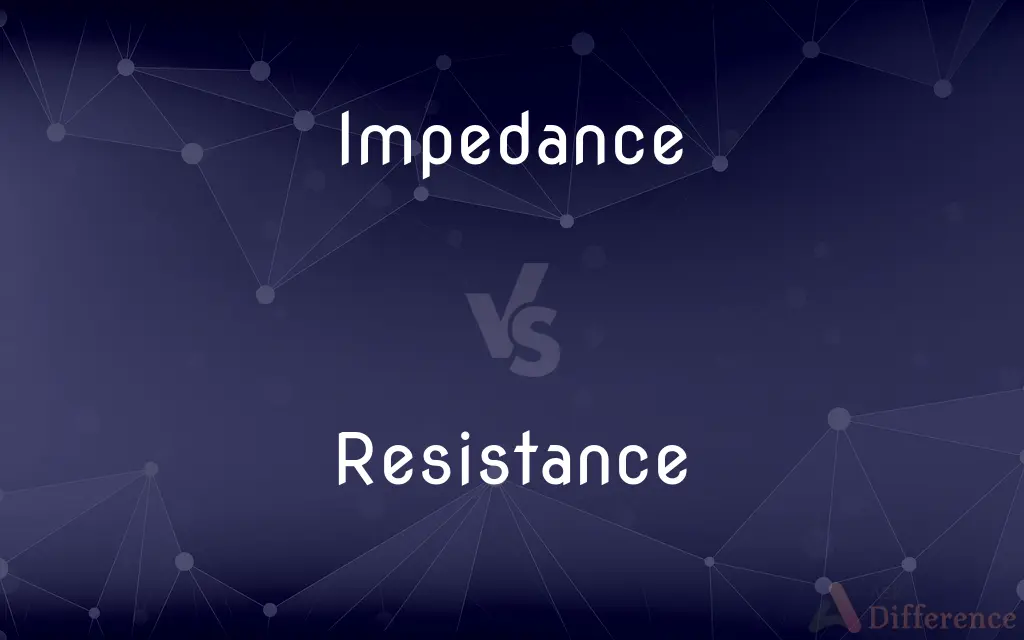Impedance vs. Resistance — What's the Difference?
By Maham Liaqat & Fiza Rafique — Updated on March 30, 2024
Impedance is the total opposition a circuit offers to alternating current, including both resistance and reactance, while resistance is the opposition to direct current, devoid of reactance.

Difference Between Impedance and Resistance
Table of Contents
ADVERTISEMENT
Key Differences
Impedance and resistance are fundamental concepts in the study of electrical circuits, but they apply to different contexts and have distinct characteristics. Impedance encompasses resistance as one of its components but also includes reactance, which is relevant only in AC (Alternating Current) circuits. Resistance, on the other hand, applies to both AC and DC (Direct Current) circuits but solely accounts for the opposition to current flow without considering the circuit's capacitance or inductance.
Resistance measures the opposition to direct current, influenced only by the material, dimensions, and temperature of the conductor. Impedance extends this concept to alternating current, where it also accounts for reactance caused by the capacitor and inductor's effect in the circuit. This makes impedance a more complex measure, represented by a complex number, whereas resistance is a simpler, real number.
While resistance is independent of frequency, impedance is frequency-dependent due to its reactance component. Reactance introduces a phase difference between the voltage and current in an AC circuit, a phenomenon absent in pure resistive circuits. This makes impedance essential for understanding the behavior of circuits under varying frequencies.
Calculating power loss in a circuit uses resistance for DC circuits, emphasizing joule heating effect, while impedance is used in AC circuits to consider both power dissipation and energy stored in the magnetic and electric fields. The distinction reflects how each term contributes to understanding circuit behavior under different conditions.
The measurement of resistance and impedance also differs; resistance can be measured with a simple ohmmeter, while impedance requires more complex methods that account for both magnitude and phase, often using specialized equipment like LCR meters or impedance analyzers.
ADVERTISEMENT
Comparison Chart
Definition
Total opposition to AC, including resistance and reactance.
Opposition to electric current, AC or DC.
Components
Resistance and reactance (capacitive or inductive).
Only the material’s inherent opposition.
Dependency on Frequency
Yes, due to reactance.
No, frequency-independent.
Measurement
Complex number (magnitude and phase).
Real number (ohms).
Applicability
Primarily in AC circuits.
AC and DC circuits.
Compare with Definitions
Impedance
Requires measuring both magnitude and phase, typically with an LCR meter.
An impedance analyzer was used to measure the complex impedance of the circuit.
Resistance
Fundamental concept for calculating voltage, current, and power.
Ohm's law, V = IR, where V is voltage, I is current, and R is resistance, is a cornerstone of electrical engineering.
Impedance
In audio systems, matching amplifier and speaker impedance maximizes energy transfer.
Audio engineers match the impedance of speakers and amplifiers to minimize power loss.
Resistance
Resistance is not affected by the frequency of the current.
The resistance of a resistor remains constant regardless of the applied AC frequency.
Impedance
Essential for analyzing AC circuits, especially those with capacitors and inductors.
To ensure optimal performance, speakers are designed with a specific impedance rating.
Resistance
The opposition to the flow of electric current, a property of materials that reduces current flow.
The resistance of a wire increases as its length increases or its cross-sectional area decreases.
Impedance
Changes with frequency due to its reactance component.
The impedance of an inductor increases with the frequency of the current passing through it.
Resistance
Can be directly measured with an ohmmeter.
The electrician used an ohmmeter to check the resistance of the heating element.
Impedance
The total opposition that a circuit presents to alternating current, consisting of both resistance and reactance.
The impedance of an RC circuit increases with frequency due to capacitive reactance.
Resistance
Used to control current flow in electronic devices.
Resistors are used in electronic circuits to limit current flow and adjust signal levels.
Impedance
Symbol Z A measure of the total opposition to current flow in an alternating current circuit, made up of two components, ohmic resistance and reactance, usually represented as a complex number R + iX, where R is the ohmic resistance and X is the reactance.
Resistance
The refusal to accept or comply with something
They displayed a narrow-minded resistance to change
Impedance
An analogous measure of resistance to an alternating effect, as the resistance to vibration of the medium in sound transmission.
Resistance
The ability not to be affected by something, especially adversely
Some of us have a lower resistance to cold than others
Impedance
The act of impeding; that which impedes; a hindrance.
Resistance
The impeding or stopping effect exerted by one material thing on another
Air resistance was reduced by streamlining
Impedance
(physics) A measure of the opposition to the flow of an alternating current in a circuit; the aggregation of its resistance, and inductive and capacitive reactances; the ratio of voltage to current treated as complex quantities.
Resistance
The degree to which a substance or device opposes the passage of an electric current, causing energy dissipation. By Ohm's law resistance (measured in ohms) is equal to the voltage divided by the current.
Impedance
(physics) A quantity analogous to electrical impedance in some other energy domain
Resistance
The act or an instance of resisting or the capacity to resist.
Impedance
A measure of opposition to motion of something subjected to a force; the ratio of force to velocity treated as complex quantities.
Resistance
A force that tends to oppose or retard motion.
Impedance
The ratio of sound pressure to volume flow rate treated as complex quantities.
Resistance
Often Resistance An underground organization engaged in a struggle for national liberation in a country under military or totalitarian occupation.
Impedance
The apparent resistance in an electric circuit to the flow of an alternating current, analogous to the actual electrical resistance to a direct current, being the ratio of electromotive force to the current. It is equal to R2 + X2, where R = ohmic resistance, X = reactance. For an inductive circuit, X = 2
Resistance
(Psychology) A process in which the ego opposes the conscious recall of anxiety-producing experiences.
Impedance
A material's opposition to the flow of electric current; measured in ohms
Resistance
Ability (of an organism, tissue, or cell) to withstand a destructive agent or condition such as a chemical compound, a disease agent, or an environmental stressor
Antibiotic resistance.
Resistance to fungal diseases.
Drought resistance.
Resistance
Lack of normal response to a biologically active compound such as a hormone
Insulin resistance.
Resistance
(Electricity) The opposition of a body or substance to current passing through it, resulting in a change of electrical energy into heat or another form of energy.
Resistance
Thermal resistance.
Resistance
The act of resisting, or the capacity to resist.
Widespread resistance to the new urban development plans
The resistance of bacteria to certain antibiotics
Resistance
(physics) A force that tends to oppose motion.
Resistance
(physics) electrical resistance.
Resistance
An underground organisation engaged in a struggle for liberation from forceful occupation; a resistance movement.
Resistance
The act of resisting; opposition, passive or active.
When King Demetrius saw that . . . no resistance was made against him, he sent away all his forces.
Resistance
The quality of not yielding to force or external pressure; that power of a body which acts in opposition to the impulse or pressure of another, or which prevents the effect of another power; as, the resistance of the air to a body passing through it; the resistance of a target to projectiles.
Resistance
A means or method of resisting; that which resists.
Unfold to us some warlike resistance.
Resistance
A certain hindrance or opposition to the passage of an electrical current or discharge offered by conducting bodies. It bears an inverse relation to the conductivity, - good conductors having a small resistance, while poor conductors or insulators have a very high resistance. The unit of resistance is the ohm.
Resistance
The action of opposing something that you disapprove or disagree with;
He encountered a general feeling of resistance from many citizens
Despite opposition from the newspapers he went ahead
Resistance
Any mechanical force that tends to retard or oppose motion
Resistance
A material's opposition to the flow of electric current; measured in ohms
Resistance
The military action of resisting the enemy's advance;
The enemy offered little resistance
Resistance
(medicine) the condition in which an organism can resist disease
Resistance
A secret group organized to overthrow a government or occupation force
Resistance
The degree of unresponsiveness of a disease-causing microorganism to antibiotics or other drugs (as in penicillin-resistant bacteria)
Resistance
(psychiatry) an unwillingness to bring repressed feelings into conscious awareness
Resistance
An electrical device that resists the flow of electrical current
Resistance
Group action in opposition to those in power
Common Curiosities
Why is impedance frequency-dependent?
Impedance is frequency-dependent due to the reactance component, which varies with frequency in capacitors and inductors.
How is resistance measured?
Resistance is measured in ohms (Ω) using tools like ohmmeters, which apply a DC voltage to measure the current response.
What is impedance?
Impedance is the total opposition a circuit offers to alternating current, including both resistance and reactance.
Can impedance be used for DC circuits?
While impedance is primarily used for AC circuits, in DC circuits, its value effectively equals resistance as reactance becomes zero.
Is resistance the same in AC and DC circuits?
Yes, resistance applies to both AC and DC circuits, but in AC circuits, total opposition includes reactance, constituting impedance.
How does the phase difference arise in AC circuits?
The phase difference in AC circuits arises from reactance, leading to a lag or lead between voltage and current.
How does resistance differ from impedance?
Resistance is the opposition to electric current, applicable to both AC and DC, while impedance includes resistance and reactance, relevant only in AC circuits.
What role does reactance play in impedance?
Reactance is the part of impedance that accounts for the storage and release of energy in capacitors and inductors, affecting the circuit's opposition to AC.
What happens to impedance at high frequencies?
Impedance varies with frequency; for example, the impedance of capacitors decreases, while that of inductors increases with frequency.
What is the practical use of understanding resistance in circuits?
Understanding resistance is essential for controlling current flow, designing circuits for specific functions, and ensuring energy efficiency.
What is the significance of measuring impedance in AC circuits?
Measuring impedance in AC circuits is crucial for understanding the circuit's behavior under various frequencies, especially for energy transfer and signal integrity.
How do capacitors and inductors affect impedance?
Capacitors and inductors introduce capacitive and inductive reactance, respectively, altering the total impedance of an AC circuit.
Why is impedance represented as a complex number?
Impedance is complex because it includes both resistance (real part) and reactance (imaginary part), capturing magnitude and phase information.
Can impedance and resistance be considered the same in some contexts?
In purely resistive DC circuits, impedance and resistance can be considered equivalent as reactance is zero.
Share Your Discovery

Previous Comparison
Noun vs. Subject
Next Comparison
Miss vs. MamAuthor Spotlight
Written by
Maham LiaqatCo-written by
Fiza RafiqueFiza Rafique is a skilled content writer at AskDifference.com, where she meticulously refines and enhances written pieces. Drawing from her vast editorial expertise, Fiza ensures clarity, accuracy, and precision in every article. Passionate about language, she continually seeks to elevate the quality of content for readers worldwide.
















































